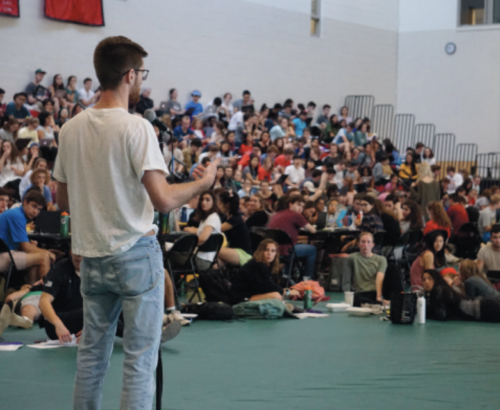By Charlie Lynn, News Editor
When Haverford’s current Student Council Co-Presidents Maurice Rippel ‘19 and Andrew Eaddy ‘19 sat down to plan this year’s Fall Plenary, they took a look back at what Plenary had been in the past. Past plenaries included three-point shootout basketball competitions, barbecues, but also important discussion about the issues affecting the Haverford community.
Eaddy says, “I think traditionally Plenary is seen as an event where you come and you ratify the alcohol policy or the Honor Code and then you leave and people aren’t very excited about it.” He adds that, “historically, Plenary has been a gathering space for discussion and an opportunity talk about important issues that affect the Haverford community and we tried to embody that today.”
Eaddy and Rippel’s plan was to combine these two elements for Fall Plenary in which only the ratification of the Alcohol Policy would be up for a vote, after a proposed resolution to create a committee to organize each plenary, similar to last year’s Special Plenary Committee, was discovered to already exist in the constitution and was removed from the agenda.
On a campus that values student engagement, it took weeks to fully fill all positions on Honor Council, Student Council, and elect Joint Student Alcohol Administration Policy Panel Co-Heads that were vacant after numerous elections for various offices failed to reach quorum. Eaddy and Rippel hoped the promise of improved free food and free t-shirts with the words “Plenary 2018: The Best You’ve Ever Seen” would boost student participation.
Despite their efforts to make this resolution-less plenary more about a chance to discuss the important issues facing the Haverford community and entice students with beloved chicken tenders, this was a plenary that featured a lack of serious engagement by the student body.
It was a plenary in which fewer than ten students came up to the microphone and in which one of the greatest shows of enthusiasm was when students hurried to line up for chicken tenders, granola bars, fruit, and pretzels after the announcement by Student Council.
Eaddy and Rippel had proposed using Plenary as a chance to discuss a number of critical issues facing the community. The Student Council Co-Presidents sent out a survey to the student body asking for them to respond with what they believed would be the most important issues to discuss. The student body responded with a wide variety of issues like the lack of a permanent director for the Women’s Center, a perceived athlete/non-athlete divide, microaggressions, and questions about student pay on campus. None of these issues were to be discussed.
The first person to speak about whether to make changes to the rules of order was concerned about whether plenary was the right space to have these discussions. No one in the GIAC responded with any questions or concerns, and when it came time to vote on the proposal, a wave of hands shot into the air to approve the proposal overwhelmingly. This, the student body had determined, would be a quick plenary.
Even though Eaddy said he wasn’t surprised by this reaction to the town hall portion of Plenary, his disappointment was evident.
Eaddy stated “I was a bit disappointed. It seemed like people didn’t take the time to think about it. It seemed like people were more excited to get out of plenary as quickly as possible. I think it had the potential to be a really cool exercise. ”
The question remains, where does Haverford go from here. Eaddy and Rippel are committed to increasing student engagement on campus, in the hopes of building on the work of past Co-Presidents to address the poor levels of engagement at plenary.
Eaddy explained, “Plenary is the biggest gathering of Haverford students in one space, and so that would sort of seem like it’s a big show of engagement by the community, but I feel like the community is not very engaged at Plenary. People are doing their homework and people are on their phones.”
There have been discussions on how to encourage more Haverford students to vote in student government including the possibility of having an election day for positions and having more of a traditional campaign to replace the simple candidacy statements that appear now. Student Council also revealed they are working with multiple people about the process of drafting resolutions for next semester’s plenary. For the moment, Eaddy and Rippel will head back to the drawing board to figure out how to encourage Haverford’s student body to be more engaged in Spring Plenary and overall student governance.
Photo by Ethan Lyne
